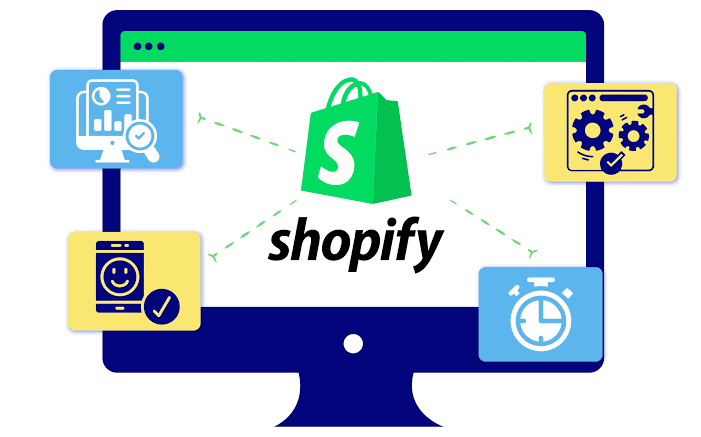Dropshipping has become popular business model for entrepreneurs looking to start an online store with minimal upfront investment. Partnering with suppliers who handle inventory and shipping dropshippers can focus on marketing. And sales. Choosing right e-commerce platform is crucial for success. It can affect everything from product listings to customer experience. This guide will explore the top 10 e-commerce platforms for dropshipping. We will highlight their features, advantages and suitability for different business needs.
1. Shopify
Shopify is one of most popular e-commerce platforms for dropshipping. It is known for user-friendly interface and extensive app store. It offers seamless integration with numerous dropshipping apps. These include Oberlo Spocket and DSers. Making it easy to find and manage products. Shopify provides customizable templates. Robust SEO features and various payment options. Its scalability is significant advantage. Accommodating small startups and large businesses alike. However, monthly fees and transaction costs can add up. So it's essential to consider your budget.
2. WooCommerce
WooCommerce is powerful open-source e-commerce plugin for WordPress. It is highly customizable and ideal for those who already have WordPress website. Prefer a self-hosted solution. WooCommerce offers numerous extensions. Plugins to facilitate dropshipping, such as AliDropship and WooDropship. Its flexibility allows for extensive customization from design to functionality. While WooCommerce itself is free. You may incur costs for hosting. Premium themes and extensions.
3. BigCommerce
BigCommerce is a robust e-commerce platform that supports dropshipping through integrations with apps like AliExpress Dropshipping and Inventory Source. It is known for its scalability and comprehensive features, including multi-channel selling, SEO tools, and advanced analytics. BigCommerce's user-friendly interface makes it easy for beginners to set up and manage their stores. However, the pricing can be on the higher side, particularly for advanced plans with more features.
4. Wix eCommerce
Wix eCommerce is a versatile platform that offers an intuitive drag-and-drop website builder, making it accessible for those without technical expertise. It supports dropshipping through integrations with apps like Modalyst and Spocket. Wix provides a range of customizable templates and essential e-commerce features, such as product galleries, secure payments, and SEO tools. While it may not be as feature-rich as some other platforms, its ease of use and affordability make it a good option for small businesses and beginners.
5. Squarespace
Squarespace is known for its stunning design templates and user-friendly website builder. It supports dropshipping through integrations with services like Printful and Spocket. Squarespace offers comprehensive e-commerce features, including inventory management, SEO tools, and multiple payment options. Its design-focused approach makes it an excellent choice for brands that prioritize aesthetics. However, its e-commerce functionalities are not as extensive as some competitors, making it more suitable for smaller stores.
6. Magento
Magento is a powerful, open-source e-commerce platform known for its flexibility and scalability. It supports dropshipping through various extensions, such as DropShipping and Dropship by Magento. Magento offers advanced customization options, robust SEO features, and comprehensive analytics. It is ideal for large businesses with complex requirements and technical expertise. However, Magento can be resource-intensive and may require a dedicated developer to manage effectively.
7. Ecwid
Ecwid is a versatile e-commerce platform that allows you to add an online store to any existing website, including WordPress, Wix, and Weebly. It supports dropshipping through integrations with apps like Wholesale2B and Printful. Ecwid offers a range of features, including multi-channel selling, mobile responsiveness, and SEO tools. Its free plan is an attractive option for small businesses just starting out. However, more advanced features require a paid plan.
8. 3dcart
3dcart is a comprehensive e-commerce platform that supports dropshipping through integrations with services like AliExpress Dropshipping and Doba. It offers a wide range of features, including SEO tools, social media integration, and various payment gateways. 3dcart's extensive customization options make it suitable for businesses with specific needs. However, its interface may not be as user-friendly as some other platforms, requiring a steeper learning curve.
9. OpenCart
OpenCart is a free, open-source e-commerce platform known for its flexibility and extensive range of extensions. It supports dropshipping through various modules and integrations, such as OpenBay Pro and AliExpress Dropshipping. OpenCart offers robust customization options, multi-store functionality, and a strong community for support. While it is cost-effective, it may require technical expertise to set up and manage effectively.
10. PrestaShop
PrestaShop is an open-source e-commerce platform that supports dropshipping through modules like AliExpress Dropshipping and DropshippingPro. It offers a wide range of features, including customizable themes, SEO tools, and multi-language support. PrestaShop's flexibility and scalability make it suitable for businesses of all sizes. However, like other open-source solutions, it may require technical knowledge and additional costs for hosting and premium modules.
Conclusion
Choosing the right e-commerce platform is crucial for the success of your dropshipping business. Each platform has its strengths and weaknesses, so it's important to consider your specific needs, budget, and technical expertise. Shopify, WooCommerce, and BigCommerce are excellent choices for their robust features and ease of integration with dropshipping apps. Wix eCommerce and Squarespace are ideal for beginners looking for user-friendly solutions with attractive designs. Magento, Ecwid, 3dcart, OpenCart, and PrestaShop offer powerful customization options for those with technical skills. By selecting the platform that best aligns with your business goals, you can set yourself up for success in the competitive world of dropshipping.
